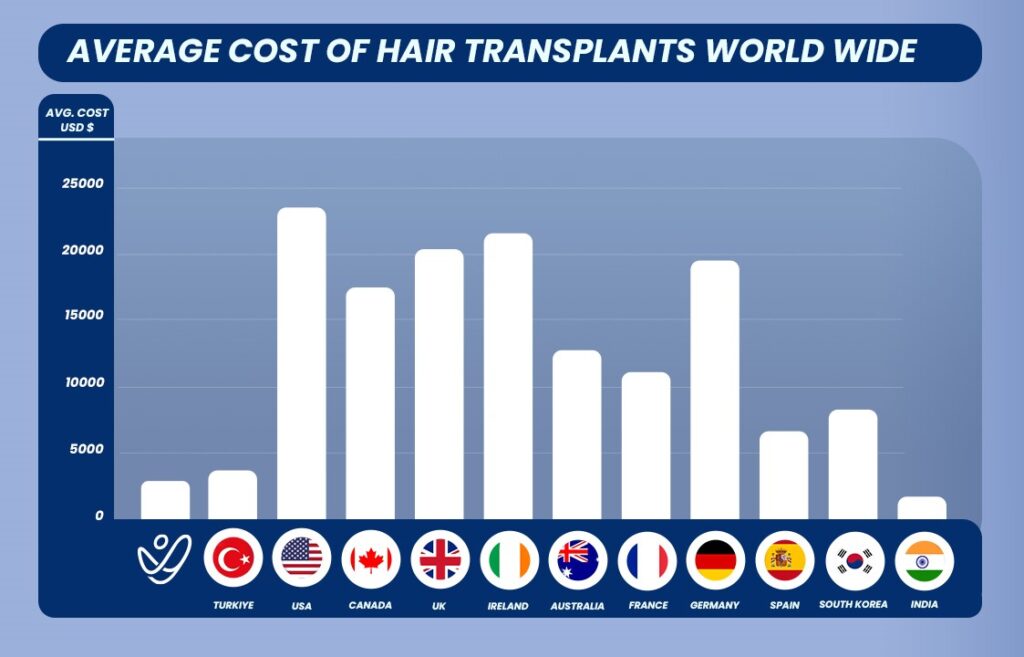
If you’re considering a hair transplant, one of the most important aspects to consider is your budget. Planning and budgeting for a hair transplant can be a challenging task, but with the right information and advice, you can ensure that you allocate the necessary funds for the procedure while also making smart financial decisions. In this article, we will discuss various factors to consider before budgeting for a hair transplant, understanding the costs associated with the procedure, setting realistic financial goals, exploring financing options, and tips for saving money and cutting costs. We will also provide guidance on how to make informed decisions that balance quality and cost, as well as budgeting for pre- and post-operative care.
Factors to Consider Before Budgeting for a Hair Transplant
Before you start budgeting for a hair transplant, there are several important factors that you need to consider. First and foremost, you should research and choose a reputable hair transplant surgeon or clinic. The expertise and experience of the surgeon can significantly affect the success of the procedure, so it’s crucial to allocate a portion of your budget for a skilled professional.
Additionally, you need to evaluate the extent of your hair loss and the type of hair transplant procedure that is suitable for your condition. Different techniques, such as direct hair implantation (DHI) and follicular unit extraction (FUE), vary in cost. Understanding the specifics of each procedure will help you estimate the expenses involved and determine an accurate budget.
It’s worth noting that the location of the hair transplant clinic can also impact the overall cost. Clinics in metropolitan areas or regions with a higher cost of living may charge more for their services compared to those in rural areas. Factors such as clinic amenities, staff expertise, and post-operative care services can also influence the pricing structure.
Lastly, it’s important to consult with a hair transplant specialist for a personalized evaluation. This will allow you to assess the number of grafts required and the overall complexity of the procedure. By taking these factors into account, you can better estimate the financial commitment involved in your hair transplant journey.
Understanding the Costs Associated with Hair Transplant Procedures
When budgeting for a hair transplant, it’s crucial to understand the costs associated with the procedure. Hair transplant costs can vary significantly depending on various factors, including the geographic location of the clinic, the reputation and experience of the surgeon, the complexity of the procedure, and the number of grafts needed.
On average, hair transplant surgeries can range from $3,000 to $15,000. However, keep in mind that this is just an estimate and the final cost may be higher or lower depending on your specific circumstances. It’s important to gather multiple quotes from different surgeons or clinics to ensure you are getting the best value for your money.

Remember that the cost of the procedure is not the only financial consideration. You should also account for any additional expenses such as pre-operative tests, post-operative medications, and follow-up appointments. These costs can add up, so it’s essential to budget for them in advance.
Furthermore, it’s crucial to consider the long-term financial implications of a hair transplant. While the initial cost may seem significant, many individuals find that the boost in confidence and self-esteem that comes with a successful hair transplant is priceless. Additionally, some insurance companies may cover a portion of the cost if the procedure is deemed medically necessary.
Another factor to keep in mind is the maintenance costs associated with a hair transplant. Depending on the type of procedure you undergo, you may need additional touch-up sessions in the future to maintain the desired results. These touch-up sessions can incur additional costs, so it’s important to factor them into your overall budget.
Setting Realistic Financial Goals for Your Hair Transplant Journey
Once you have a clear understanding of the costs associated with a hair transplant, it’s time to set realistic financial goals. Assess your current financial situation and determine the amount you can comfortably allocate towards the procedure. It’s important to strike a balance between your desire to have the procedure and your overall financial well-being.
If the estimated cost of the procedure exceeds your current budget, you may need to explore financing options or consider saving up for the treatment over time. Ensure that your financial goals align with the projected timeline for your hair transplant journey.
Additionally, it’s beneficial to research different clinics and surgeons to find one that not only fits your budget but also has a proven track record of successful hair transplants. Look for reviews and before-and-after photos to gauge the quality of their work and ensure you are making an informed decision.
Furthermore, consider factoring in post-transplant care and any additional expenses that may arise during your recovery period. It’s crucial to have a comprehensive financial plan that covers all aspects of the hair transplant process to avoid any unexpected financial strain.
Exploring Financing Options for Hair Transplant Surgery
If you don’t have the necessary funds upfront, there are various financing options available for hair transplant surgery. Many clinics offer financing plans that allow you to pay for the procedure in installments. Before committing to a financing option, carefully review the terms and conditions, including interest rates and repayment plans.
Additionally, you may want to explore other financial resources, such as personal loans or healthcare credit cards. These options can provide the flexibility you need to manage the cost of the procedure while ensuring you receive the treatment you desire.
It’s essential to consider all aspects of financing your hair transplant surgery, including the potential impact on your credit score. Taking out a loan or using a credit card to finance the procedure could affect your credit utilization ratio and overall creditworthiness. Be sure to create a detailed budget that outlines how you plan to repay the borrowed funds to avoid any negative consequences.
Furthermore, some clinics may offer in-house financing options with competitive interest rates and flexible repayment terms. These arrangements can simplify the payment process and may be more manageable than external financing options. Before making a decision, compare the various financing choices available to determine the best fit for your financial situation and long-term goals.
Tips for Saving Money and Cutting Costs on Your Hair Transplant Budget
While a hair transplant is a significant financial investment, there are several tips and strategies that can help you save money and cut costs without compromising on the quality of the procedure. Consider the following:
-
- Research and compare: Take the time to research and compare different surgeons and clinics. Look for testimonials and reviews to ensure that you choose a reputable provider who offers competitive pricing.
- Timing: Consider scheduling your procedure during off-peak seasons or times when clinics may offer discounts or promotions.
- Traveling for treatment: Explore the possibility of traveling to a reputable clinic in a different location. This can sometimes result in significant cost savings without compromising on the quality of care.
- Consider package deals: Some clinics offer package deals that include the procedure, accommodations, and transportation. These packages can provide cost savings and added convenience.
- Stay informed: Stay up-to-date with advancements in hair transplant technology. Newer techniques may offer more affordable options without sacrificing effectiveness.
Balancing Quality and Cost: How to Make Informed Decisions for Your Hair Transplant Budget
When budgeting for a hair transplant, it’s important to strike a balance between the quality of the procedure and your budgetary constraints. While it may be tempting to opt for the lowest-priced option, it’s essential to thoroughly research and evaluate the expertise and reputation of the surgeon or clinic you choose.
Remember that a hair transplant is a long-term investment in your appearance and self-confidence. Therefore, it’s crucial to prioritize the overall quality and success of the procedure over immediate cost savings. Seek out a highly skilled surgeon who specializes in hair restoration and has a track record of successful outcomes.
Budgeting for Pre- and Post-Operative Care in Your Hair Transplant Plan
When budgeting for a hair transplant, it’s vital to consider not only the procedure itself but also the pre- and post-operative care. Pre-operative care may include consultation fees, blood tests, and any necessary medications or supplements. These costs can vary depending on your specific needs and the requirements of the surgeon or clinic.
Post-operative care is equally important and may include follow-up appointments, medications, and specialized hair care products. Budgeting for these expenses in advance will ensure that you are fully prepared and can focus on proper healing and recovery following the procedure.
. . .
Budgeting for a hair transplant requires careful consideration of various factors. By conducting thorough research, understanding the costs associated with the procedure, setting realistic financial goals, exploring financing options, and implementing money-saving strategies, you can ensure that you are well-prepared to embark on your hair transplant journey. Remember to prioritize quality and seek out experienced professionals who can help you achieve the best possible results. With proper budgeting and planning, you are one step closer to regaining your natural hair and boosting your self-confidence.







